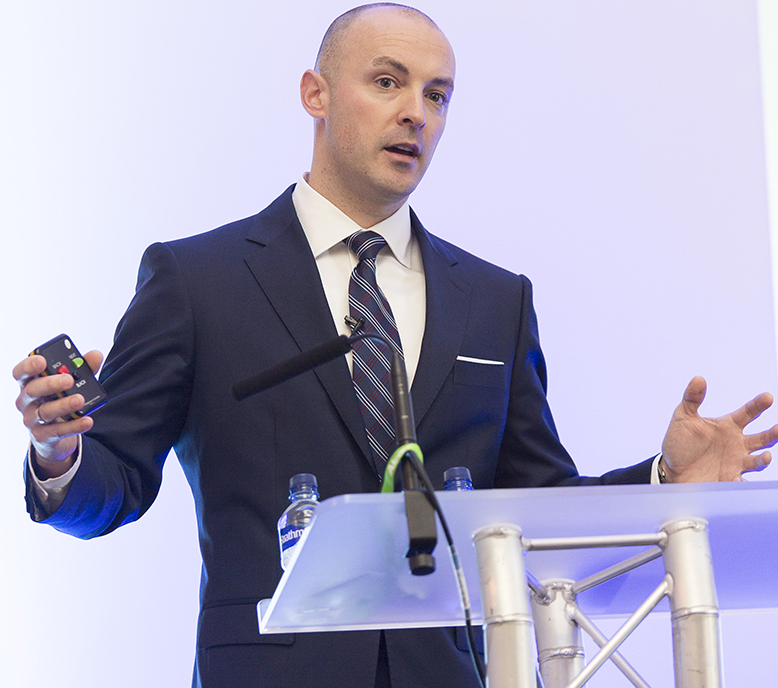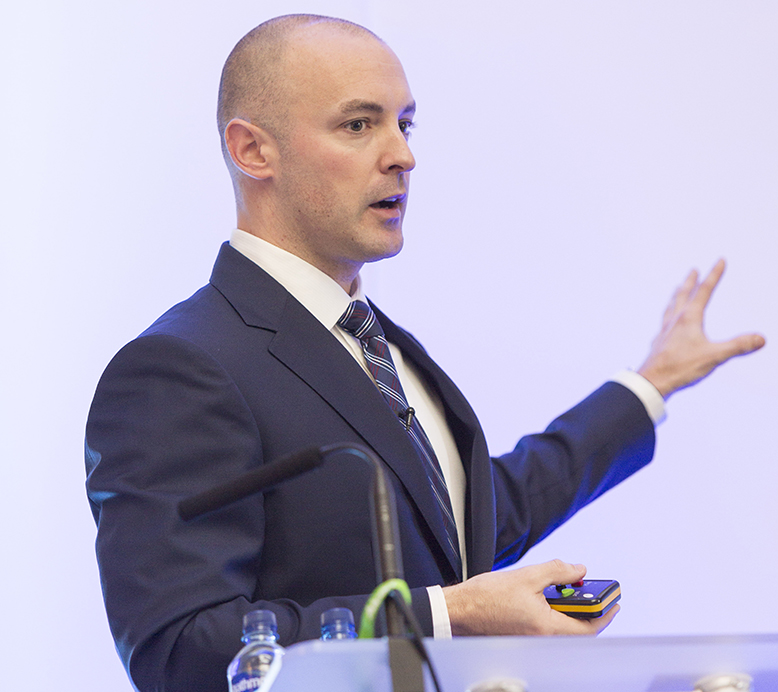- OT
- Industry
- Contact lenses
- Fresh concepts
Fresh concepts
Alcon’s Pierre Bourdage on the cause of independents on the High Street, the disruptive power of Amazon, and Alcon’s vision for growth

15 June 2016
‘New Year, new start.’ A well-worn trope, but one that has proved to be a call to action for Alcon associates and its UK and Ireland general manager, Pierre Bourdage.
Having joined the business in late 2015, the fresh-faced Canadian has spent the first quarter of 2016 driving structural changes to a business that is aiming to transform and innovate its business model.
“Alcon is a company that has grown very successfully over many years across three divisions,” he explained to OT, referring to Alcon’s pharma, surgical and vision care (contact lenses and contact lens care) business units. But a change in strategic vision at Alcon has brought with it a new focus on MedTech, encompassing the surgical and vision care arms. The Alcon pharmaceutical unit has been transferred as of April 2016 to the Novartis pharmaceuticals division.
"It is really important that the healthcare practitioner can tie the clinical discussion to the proposed solution in one holistic way"
“In the pharma pipeline, you are looking at multibillion long-term projects to develop one new drug, with a high risk of failure,” explained the company’s general manager (GM) of Alcon UK and Ireland. “In the Medtech pipeline, new product development investments are smaller, but the development and innovation cycles are much quicker than in pharma. So by nature, the two business models (pharma versus Medtech) are very different and require different skills and focus.
In February it was announced that the Alcon pharma division would be moved to the larger Novartis affiliate – a process that took two months from the official transfer planning, and is now complete.
While the pharma arm has moved, Alcon has no plans to leave Camberley, Mr Bourdage reiterates. “The pharma business for Alcon was a smaller part of our local business – the larger segment of our business is in surgical and vision care. This new strategic direction in MedTech gives us better focus as a company.”
Job done – so what next? For Alcon’s GM, he sees the challenge in two areas. Firstly, how does the company “partner more effectively with customers?” Second, how will it accelerate development, and bring through more breakthrough innovations?’
Unmet needs
Any progress in the contact lens category must start with an understanding of the landscape, and the challenges ahead.
Sharing his “early observations” with OT, Mr Bourdage stresses that the reports and studies he sees show category growth in the UK “in volume and dollars,” while market penetration sits anywhere between 12–15%.
“The interesting thing in the recent market research that I have seen is that interest in the category is typically 2–5% ahead of current contact lens penetration,” he adds. “So, fundamentally, research is showing that people are interested in contact lenses at a rate that is above the current usage rate.”
The GM also highlights that a fresh approach to segments such as kids and teenagers is needed. “These are groups that do not have a lot of access to information about contact lenses,” he says.
For Mr Bourdage, while eye care product aesthetics and comfort are both key, the principal factor for the business and the sector to address is unmet medical need.
“That is where Alcon is moving – now and in the future,” he confirms. “Look at where our research and development interests are – you will have read quite a bit about our Google partnership and the potential for accommodating contact lenses, and contact lenses that can monitor glucose levels.”
Some would say these factors are not mutually exclusive – a point Mr Bourdage is quick to acknowledge. “We have to focus on comfort and aesthetics, but we also need to focus the category toward breakthrough innovation.”
Flexing those muscles
What is Alcon’s place in the contact lens market today? Having joined the business eight months ago, the GM is frank about what the future needs to hold.
“I think we need to be more energised around the healthcare practitioner – including the realities of clinical work and patient interaction. I want us to become more focused externally on the market and our customers. That is where the team is working hard – and I think we are beginning to make good progress.”
One of these challenges is to engage the consumer – no mean feat when the product pipeline in contact lens product development is much slower than, say, spectacles. So what can Alcon do in this space to help?
“It is a great point,” concludes Mr Bourdage with a smile. “There is much that we can do commercially and in professional affairs. Large retail chains, in addition to independents and independent groups, want support in professional affairs & patient education. We see a huge opportunity there where we can play a supportive role as a great partner to them.”

Discussing examples of the concept in action, the GM points to Dailies Total1. “It is an amazing technology, taking years of research and development. By nature of its superb value proposition to wearers, it is priced in the premium segment, and we see good uptake and great customer experience – and importantly, we still see a lot of room to grow.
“When I look at the statistics – if the number one reason for dropout in the category is lack of all-day comfort and the top medical need is a best-in-class breathable lens, Dailies Total1 offers the wearer a great solution. The key is to ensure we are playing a proactive role in supporting consumers in understanding the value of these Dailies Total1 benefits for their comfort and eye health.
Highlighting Alcon’s desire to play a leading role promoting contact lenses in the digital space, Mr Bourdage shared news of an initiative being planned called ‘wear lenses.’
“It is early on, but the idea is one of a sustained patient outreach campaign, across a variety of different digital channels. We want to reach the consumer and empower them. More will be announced on this during 2016.”
Drilling home the message
And what of the importance of eye health, OT asks Alcon’s GM – is the profession doing enough to engage the public?
For Mr Bourdage, “my feeling is that it is never enough. Eye health in general is such an important part of our health, but it certainly is one where the structure of the health system, and the social landscape around it, is not necessarily where it would ideally be.
Giving the example of dentistry, he notes that the profession “seems to have a stronger foothold, a stronger network of support,” than eye care, because people seem to understand that they need to have healthy teeth, and that without proper dental care this can lead to serious medical consequences. Whereas often in eye care, the consumer and industry focus is on the cosmetic appeal of various products, but there is less emphasis and investment in the importance of eye health, preventable eye disease, and how eye care products can deliver great value to consumers from these eye health perspectives.
His eye care experience in his home country of Canada, he adds, was “very good.”
“We have standard family insurance offered through most workplace benefit schemes that allow us to have an eye exam as a regular part of a health check-up. I think because access to check-ups, including the cost of eye care products, is covered by most of these benefit plans, it is a very common thing as a child to get your eye health checked annually, in the same way you would get your teeth checked at the dentist. I feel here [in the UK], and perhaps this is an early perception that is not fully accurate, there seems to be a larger focus on the aesthetic elements of eye care and eye care products. I just think we need to also focus on the unmet medical need, and the fact people need continuous eye care exams to ensure good eye health, and that vision care product quality and innovation are important supportive tools for this.”
Extending this logic, OT asks if the eye test should be divorced from the dispensing altogether. Mr Bourdage nods: “It is a good question, and, to be candid, I don’t know enough to have a firm opinion.”
"We need to be more energised around the healthcare practitioner – including the realities of clinical work"
The conflict, he concludes, is “part of the healthcare dilemma” – one that it is incumbent on professional bodies to govern.
“As a consumer, there might be a level of concern that the person who is diagnosing their eye care issue is also the person who is suggesting the use of a specific product. And this person may or may not be benefitting from the sale of a product from a business perspective,” he explains.
“If I look at the markets that I have participated in (immunology, cardiology, and so on) and now in optics, it is really important that the healthcare practitioner can tie the clinical discussion to the proposed solution in one holistic way. So by nature, it’s difficult to separate the two and simply determine that eye tests should be divorced from dispensing.”
Another long-running debate centres on the fitting of children and adolescents with contact lenses. For Mr Bourdage, a cohort of studies show that attitudes around contact lens penetration in kids call for a degree of “demystification,” arguing that kids will accept contact lenses, and will be able to get used to fitting and wearing them.
Reflecting on the reality for his young family, Mr Bourdage explains: “My five-year-old plays a lot of football, and I would never want to see him hold himself back in a position where he does not feel comfortable playing football because he does not have the right eyewear.”
Rallying the retailers
In an ever-changing business landscape, OT asks Mr Bourdage about the challenge facing independent High Street optical practices, some of which have shared their concerns about the struggle to compete with big retailers that are able to secure and offer a better price point for contact lenses to the patient.
The reality, asserts the GM, is not a situation unique to optics, and points to the need to offer a “distinct value offering, to differentiate, to innovate – in terms of how the practice feels to the consumer, and how the service is provided. There has to be a tangible feeling of proving a unique and tailored experience.”
However, he reiterates that both have their place on the High Street. “It is good for consumers that there is competition, and it is good for consumers when there is a healthy penetration of both. The proposition is this: when big retailers are predominantly the larger percentage of the market, that puts even more pressure on independents, and it means that they do need to be innovative and value focused – and translate what they say and what they deliver more effectively to the consumer.”

Returning to the analogy of the company’s Dailies Total1, the GM added: “We have a premium product with best in class combination of all day comfort and breathability. We have to articulate very well why this is the best product on the market, and why we think the technology is going to translate into benefits that are great for the wearer. If we are providing a unique innovation, there is not just the innovation that matters, but everything about how we communicate about it.”
Is it, therefore, the case that Alcon should act to support the particular needs of the independent? “Yes, we can. We have to. As a partner, we have to help and want to help. What role that will be depends on the dialogue we have together. The key message is that Alcon absolutely values and wants to support independents to ensure their tailored value proposition stands out to consumers.”
The digital dynamic
Turning to online retailing, what level of concern should the profession have for this segment of the retail landscape, OT asks Mr Bourdage.
Agreeing that “a lot has and is changing in the online space,” Mr Bourdage notes that Alcon has been moving with the times as a business. “We have a newly regionally harmonised internet management process through Alcon Europe that is getting better. We are aiming to better standardise how we operate on the Internet.”
The GM is clear that the web represents a long-term transformative environment, to be ignored at our peril. “If you look at large Internet retailers, if one of them decides to make a heavy and disciplined approach to push into the optical space, it could be very disruptive in the long term.”
Change of this kind, however, “could be a good thing for the industry in the long term.” How so? For Mr Bourdage, the fundamental question must be: “How do we act now, as industry leaders with our customers, to leverage the web, to get better at service wrapped around contact lenses and the value we provide to consumers and opticians?”
"The key message is that Alcon absolutely values and wants to support independents"
Sharing the story of attending a tech innovation conference in the mid 2000s, Mr Bourdage recalls “a leader on stage” who was talking about how he was going to transform the landscape in which consumers interact with retailers. This was during a time of domination from large traditional retailers. “A lot of people in the audience were thinking about the dot.com boom, feeling cautious about the vision being put forward by this company. That leader on stage was Amazon CEO, Jeff Bezos. At that time, Amazon had revenues of $6 billion. Today Amazon has revenues of over $100 billion per year. What a change in a decade.”
The same thing, argues the Alcon GM, could happen in the optical space over the long term. “An innovator could come in and transform it – so we are better off partnering together and transforming the sector together to add value for our customers and consumers. And, in the end, the Internet can sometimes be a very good thing, if we work together and use it to differentiate and add value.”
But are there areas for concern, thinking about eye health, and making sure that the right product reaches the right patient at the right time? “Yes there are many areas to be very careful when bridging healthcare into the digital space. Time will tell what the future holds.”
“Alcon is a leader in contact lens care, and we will be part of the transformation. We want to play a role where anyone involved in optical health can say, “Alcon has been a big part in bringing great innovative products, and helping the sector bring those products to the consumer and give the profession the tools to provide value through the product and beyond.”
Pierre Bourdage joined Novartis in 2003, working in it’s pharmaceutical division within Canada, across several different commercial roles. He joined Alcon UK in late 2015 as GM of Alcon UK & Ireland.


Comments (0)
You must be logged in to join the discussion. Log in